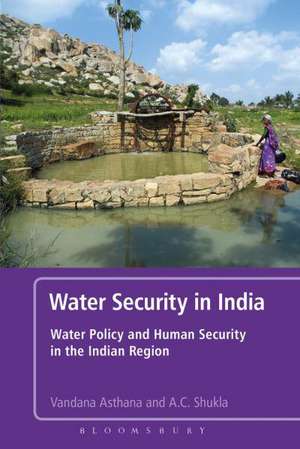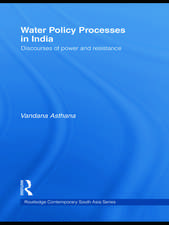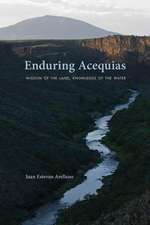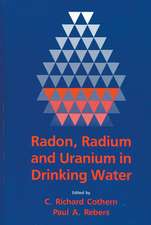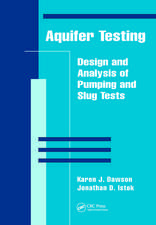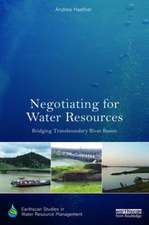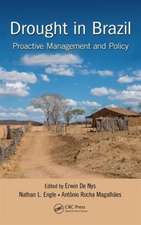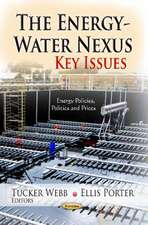Water Security in India: Hope, Despair, and the Challenges of Human Development
Autor Dr. Vandana Asthana, Dr. A. C. Shuklaen Limba Engleză Paperback – 17 dec 2014
| Toate formatele și edițiile | Preț | Express |
|---|---|---|
| Paperback (1) | 244.18 lei 3-5 săpt. | |
| Bloomsbury Publishing – 17 dec 2014 | 244.18 lei 3-5 săpt. | |
| Hardback (1) | 837.13 lei 6-8 săpt. | |
| Bloomsbury Publishing – 17 dec 2014 | 837.13 lei 6-8 săpt. |
Preț: 244.18 lei
Nou
Puncte Express: 366
Preț estimativ în valută:
46.73€ • 48.27$ • 38.89£
46.73€ • 48.27$ • 38.89£
Carte disponibilă
Livrare economică 04-18 martie
Preluare comenzi: 021 569.72.76
Specificații
ISBN-13: 9781441179364
ISBN-10: 1441179364
Pagini: 416
Dimensiuni: 152 x 229 x 30 mm
Greutate: 0.68 kg
Editura: Bloomsbury Publishing
Colecția Bloomsbury Academic
Locul publicării:New York, United States
ISBN-10: 1441179364
Pagini: 416
Dimensiuni: 152 x 229 x 30 mm
Greutate: 0.68 kg
Editura: Bloomsbury Publishing
Colecția Bloomsbury Academic
Locul publicării:New York, United States
Caracteristici
Discusses water as the key factor to create a security community across India, Pakistan, Bangladesh
Notă biografică
Vandana Asthana, a Professor of Government, Eastern Washington University, USA, writes and researches the human and developmental challenges of water and environmental security in South Asia with a special focus on India. Dr. A.C.Shukla, former member and Chartered biologist of Institute of Biology, London, UK is a well-known, widely traveled speaker, researcher and author of several books and articles on environment, policy and security.
Cuprins
PrefacePart IChapter 1: Introducing the concept: Water securityChapter 2: Water resources of IndiaPart IIChapter 3: Agriculture and irrigation development in IndiaChapter 4: Industrialization, urbanization and population growthChapter 5: Vulnerability of climate changeChapter 6: Policy and institutional driversPart III Chapter 7: Privatization of waterChapter 8: Intrastate water disputesChapter 9: Water security in India's neighborhoodChapter 10: Water vision and shifts in management practicesChapter 11: Water security: Hope and despairBibliographyIndex
Recenzii
An impressive addition to the growing body of literature reexamining the definition of "security" in the 21st century. Further distinguishing this work is the authors' thoughtful examination of water security as it applies to India-making this one of the first studies to do so.
This book affords an important, well-researched case study on the problem of freshwater sustainability. The authors tackle the complex issue of how human security is actually a tightly-interconnected array of factors including governance; particularly state capacity for regulating water supply and quality, as well as private water rights, water markets, and trans-boundary institutions which cooperate over water allocation. By rejecting that narrow definition of human security as the avoidance, say, of basin-wide conflicts that threaten peacekeeping, Asthana and Shukla are able to show how this important concept actually require institutions charged with managing vital resources such as water to: provide for basic human needs; ensure the renewability of a resource; and, reduce vulnerability to climate and other environmental hazards which threaten its vigor. They further argue that human security for water is achieved by enabling the political and economic institutions which manage these resources to become more resilient through reforms that make them more representative as well as responsive to popular demands and socially-just outcomes. Students of water policy everywhere will immensely benefit from this work - not just scholars focused on South Asia."
[Water Security in India] makes a compelling and data-driven case for waking up to the alarming realities of water challenges faced by the Indian subcontinent . . . For anybody interested in water security, its intricate links with other forms of security and the threats water stress poses to the South Asian region in general . . . this book is a must read!
Water more then anything else will play a major role in either preserving or destroying life in the 21st century. With climate change and global warming threatening the planet, a focused study like this is an eye-opener, which we cannot choose to ignore
This book affords an important, well-researched case study on the problem of freshwater sustainability. The authors tackle the complex issue of how human security is actually a tightly-interconnected array of factors including governance; particularly state capacity for regulating water supply and quality, as well as private water rights, water markets, and trans-boundary institutions which cooperate over water allocation. By rejecting that narrow definition of human security as the avoidance, say, of basin-wide conflicts that threaten peacekeeping, Asthana and Shukla are able to show how this important concept actually require institutions charged with managing vital resources such as water to: provide for basic human needs; ensure the renewability of a resource; and, reduce vulnerability to climate and other environmental hazards which threaten its vigor. They further argue that human security for water is achieved by enabling the political and economic institutions which manage these resources to become more resilient through reforms that make them more representative as well as responsive to popular demands and socially-just outcomes. Students of water policy everywhere will immensely benefit from this work - not just scholars focused on South Asia."
[Water Security in India] makes a compelling and data-driven case for waking up to the alarming realities of water challenges faced by the Indian subcontinent . . . For anybody interested in water security, its intricate links with other forms of security and the threats water stress poses to the South Asian region in general . . . this book is a must read!
Water more then anything else will play a major role in either preserving or destroying life in the 21st century. With climate change and global warming threatening the planet, a focused study like this is an eye-opener, which we cannot choose to ignore
